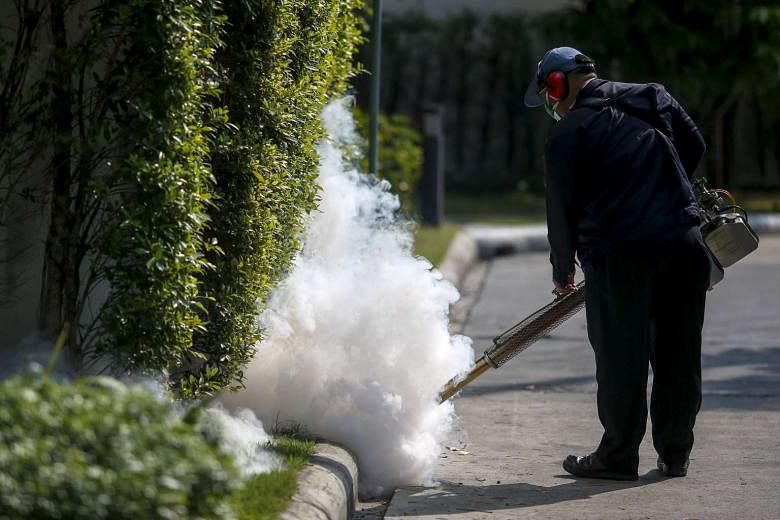The Zika virus will come to Singapore, but is unlikely to result in major outbreaks here in the way that dengue has, an infectious disease expert has told The Straits Times.
The virus has infected millions of people in South America, with Brazil claiming it is the reason more than 4,000 babies have been born with abnormally small heads since October last year.
But Dr Lim Poh Lian, head of the infectious diseases department at the Institute of Infectious Diseases and Epidemiology at Tan Tock Seng Hospital, said that when Zika arrives here, it is likely to have a similar effect as chikungunya.
The first transmission of chikungunya in Singapore was in 2008, but numbers have remained low, peaking in 2013 with 1,059 cases. Last year, 42 people were infected.
To prevent Zika's spread, anyone with a confirmed infection will be hospitalised until tests show he no longer harbours the virus in his blood, Dr Lim said.
-
What is Zika?
It is a virus spread through the bite of an Aedes mosquito. It usually causes fever, rashes, joint pain and conjunctivitis for up to a week.
How do I know if I have Zika?
You can tell for sure only with a blood test. Your doctor will perform one if you have been to a Zika outbreak area recently - the virus is not spreading here.
How is it treated?
There is no vaccine or specific treatment. Victims are encouraged to rest and drink plenty of water. They are treated for their symptoms.
Is it dangerous to pregnant women?
While not proven, there is a strong possibility it can cause a rare birth defect known as microcephaly, which results in an infant being born with a smaller than usual brain and head.
What happens to children with microcephaly?
They are usually slow to develop, might suffer intellectual disability, have poor vision and motor skills, and possibly seizures.
There is no cure, but speech and occupational therapies as well as physiotherapy might help them to manage better.
How do I protect myself?
Prevent mosquitoes from breeding. Individuals can also wear long trousers and clothing with long sleeves and use mosquito repellent.
As both Zika and dengue have similar symptoms, she said a person would be suspected to have Zika only if he had been to an area where there is an outbreak.
A blood test would confirm this within 48 hours.
Zika is normally a pretty mild disease, although it is feared it could be dangerous to unborn babies if their mothers are infected.
Dr Lim said "it is strongly suspected but not scientifically proven" that it causes microcephaly - a condition where infants are born with abnormally small brains and heads - if the mother is infected while pregnant. Such children face a high risk of serious developmental problems, both mental and physical, and also shorter lifespans.
Dr Lim advised pregnant women to protect themselves against mosquito bites.
Zika, like dengue and chikungunya, is spread by the Aedes mosquito, which is currently causing an out-of-season dengue epidemic here.
There were 636 reported cases of dengue last week and more than 2,500 last month - compared with less than 1,000 in January last year.
Dengue numbers have been rising since the middle of December.
"We think it's going to be a bad year for dengue," said Dr Lim, adding that infections will likely top the previous high of more than 22,000 cases in 2013.
There are now 151 active clusters, mostly in the eastern half of the country. The biggest cluster, in Tampines around Avenue 4 and Street 81, is still growing and now has 267 cases, of which 26 were reported within the past fortnight.
facebook.com/ST.Salma


